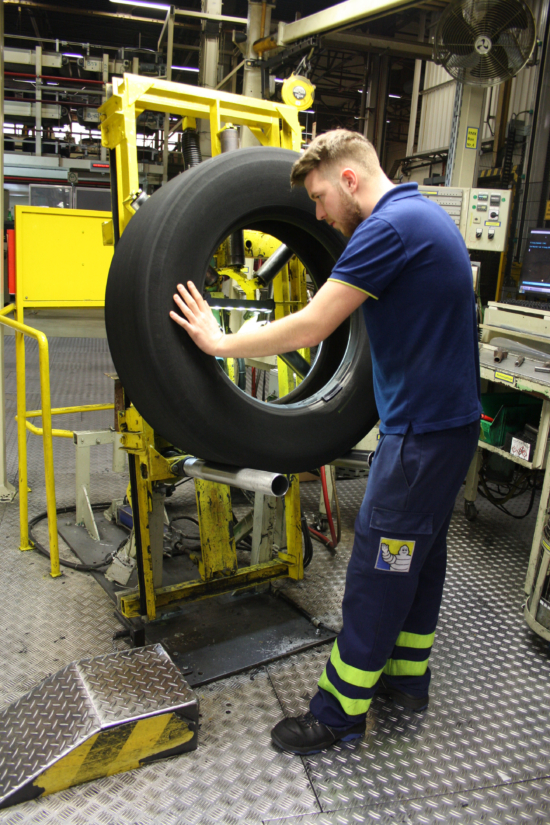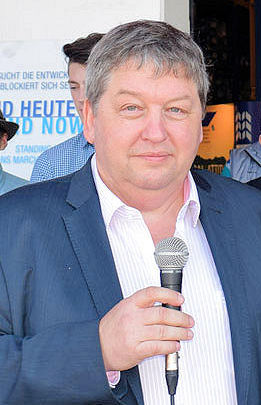Coronavirus crisis hits retreading industry hard
 According to the major material suppliers, the retreading industry reached the low point of its own corona crisis in April: Whether the year ends well or not depends upon whether we experience a second wave of the virus (Photo: Michelin)
According to the major material suppliers, the retreading industry reached the low point of its own corona crisis in April: Whether the year ends well or not depends upon whether we experience a second wave of the virus (Photo: Michelin)
Hopes of recovery later in the year – logistics “never an issue”
The coronavirus crisis is global in its spread, but as generally known its affect so far has varied from country to country as well as from industry to industry. This is certainly the case within the retreading sector. While it’s been business as usual in Scandinavia and, to some extent, markets in the Baltic region, firms in Mediterranean countries, particularly Italy, were plunged into turmoil. Although the unanimous view amongst material suppliers in Europe – a lot can be read about the state of the market and its development from observing these companies’ business – is that Europe’s retreading market has slumped by around ten to 15 per cent up to and including May, forecasts for the remainder of the year vary. In doing so, they depend significantly upon the answer to one particular question: Are we experiencing a shortage of new tyres, as during Europe’s boom retreading years of 2010 and especially 2011? We asked how things look at two of Europe’s leading material suppliers – Kraiburg and Marangoni.
Business within the European retreading industry was relatively unspectacular up until early- to mid-March. Most likely it wasn’t any stronger than a year earlier, but sales were solid. News of the coronavirus increasingly appeared on our radar as stories emerged about the pandemic developing in China. But it left hardly a mark upon European retreaders’ day-to-day business during the first two months of the year. This changed suddenly and rapidly from mid-March, parallel to the restrictions in private, public and economic life that were then adopted in almost all European countries.
Many companies reduced or stopped their production entirely in the acute shutdown phase, primarily in response to to a slump in demand but also to protect their workforces from infection. But what isn’t produced and isn’t delivered can’t be invoiced. Liquidity is under pressure everywhere, and purchases such as tyres – new or retreaded – are less frequent.
According to Holger Düx, this effect hasn’t by any means been equally dramatic throughout Europe. While the German market has “got off with a slap on the wrist” so far, the Kraiburg Austria sales director says markets in southern Europe, particularly Italy, have been hit much harder. Düx reports a ten to 15 per cent decline in Germany in the first five months of the year, making this market about average when looking at overall development throughout Europe. Italy, in contrast, collapsed almost completely from mid-March, as did Spain. April was an absolutely exceptional month for all market players, with sales slumping more than 80 per cent year-on-year in some cases. By the time we got to May the situation in Italy had already recovered slightly, provided you’re comfortable calling a year-on-year drop of more than 50 per cent a recovery. The sales manager stresses that such figures should be read with caution, but they nevertheless clearly document the direction that different markets have taken.
Business ‘simply very, very bad’
As Matthias Leppert, managing director of Marangoni Retreading Systems Deutschland GmbH, emphasises, markets in Europe were hit differently by the corona crisis (Photo: Marangoni)
Likewise, Matthias Leppert can also only share his interpretation of these trends. The managing director of Marangoni Retreading Systems Deutschland GmbH (MRSD) emphasises that the month of April was the weakest in Europe for a long time; business for the firm’s customers was “simply very, very bad.” Although Leppert believed he could see signs of improvement when we spoke to him in May, the extent of this improvement, if at all, wasn’t yet clear. The greatest slump Marangoni experienced in Europe occurred in its home market of Italy, and in contrast the company was astonished by the Scandinavian markets’ incomparable resilience to the effects of the corona crisis. All “remained well with the world” in countries such as Sweden and Norway, at least as far as the retreading business is concerned. Maybe the economic consequences of the global pandemic will arrive there later, or not at all, or perhaps just to a limited extent – none of this is certain right now. What’s more, a buying-up of retreading products sitting in warehouses, similar to the panic buying that depleted stocks of toilet paper, was seen in countries that didn’t immediately feel the affects of the corona crisis. It is questionable whether such sales will remain in the plus side of the statistics over 2020 as a whole. “That will probably be put into perspective again in the course of the year,” adds Kraiburg Austria’s Holger Düx. All in all, it’s worth mentioning that although markets within Europe have developed very disparately in recent weeks, almost all developed negatively, even if the declines in May were already slightly relativised. These developments were further confirmed when we spoke with well-known material suppliers with production facilities outside Europe.
Fear of severed value chains was ubiquitous during the acute phase of shutdown in Europe from mid-March. Border closures and weeks of quarantine for international travellers fuelled fear that international trade would collapse. Yet this largely didn’t happen, reports MRSD managing director Matthias Leppert. Transportation of raw materials to the two Marangoni tread production facilities – which never stopped operating despite concern that local authorities in Italy would order plants to close – was never at risk. Likewise, there was no significant interruption in the shipment of treads manufactured at MRSD plants in Henstedt-Ulzburg (Germany) and Ferentino (Italy) to domestic and international customers. The same applies for Kraiburg, where logistics from its plant in Geretsberg, Austria was “never an issue” in the period from mid-March. Sales director Düx shares that “there were at worst minimal delays,” and initial fears were entirely unfounded.
It’s still difficult to assess the extent to which Europe’s retreading market will stabilise in the coming months. Many retreaders reportedly continue to work reduced hours, at least in countries where this is an option, and until recently this scenario also applied to the two major material manufacturers. While Düx says Kraiburg Austria considers it possible if not “realistic” to achieve last year’s level of sales in 2020, Marangoni Retreading Systems Germany expects a “catch-up effect” later in the year.
Availability of new tyres and casings
How far such an effect can go largely depends on the availability of new tyres. Retreaders fondly remember the two boom years of 2010 and 2011. At that time, sales of retreaded tyres in Europe jumped from 4.5 million to at least 5.5 million units before subsequently subsequently returning to their ‘normal’ level and then decreasing even further until reaching an all-time low. Marangoni and Kraiburg Austria both stress that signs don’t yet point to a new boom. It appears the initial effect of the 2018-enacted European Union anti-dumping and anti-subsidy duties on Chinese truck tyres has already largely been lost on the local market. Production in China has already returned to normal after the shutdowns announced there in January. After an interruption in deliveries lasting several weeks, new tyres from Asia are arriving in Europe as normal, increasingly from sites in Southeast Asia such as Thailand or Vietnam.
And there is even talk of significantly reduced freight times. Voyages at full speed may be expensive for shipping companies as this significantly increases a container ship’s fuel consumption, but the expense was nevertheless considered worthwhile in order to process an enormous backlog of orders. As we entered May, leading brands in Europe were also resuming production at their new tyre plants, starting with truck tyre production, as well as at their retreading facilities. All these factors don’t suggest an impending shortage of new tyres.
A new boom would certainly be in the interest of the entire retreading industry. We’ll see in the coming months whether this will eventuate or not. Even more importantly, and there is great fear of this, we need to avoid a second wave of the corona epidemic and associated renewed shutdowns in Europe. The current ‘new normal’ is certainly preferable to a return to a Europe-wide standstill. At the moment we’ve heard no news about bankruptcies or impending bankruptcies in the industry, but there’s fear they’ll come – as is the case with people, the virus hits companies with ‘pre-existing conditions’ particularly hard.


 Kraiburg Austria
Kraiburg Austria
Comments